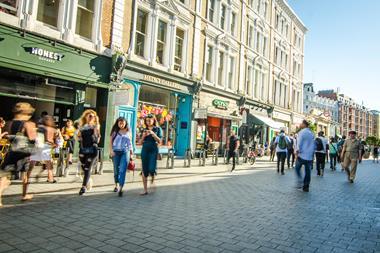In the aftermath of 9/11, intense and ultimately misguided speculation surrounded the future of high-rise developments. Similarly, many are today heralding the end of traditional office occupation as we know it following the pandemic.

As I wait in isolation for a vaccine, I am fascinated by how people’s mindsets may have been altered by this dreadful virus.
Understanding how different elements of society will react may help inform us how physical space might be utilised. Will fear quickly be forgotten or have our psyches been changed forever?
Until now, the buzzword associated with working from home (WFH) has been ‘productivity’ but, increasingly, we are interested in mental welfare. You might be the most productive person in the business working from home, but you might also be the unhappiest.
We have already seen many urban dwellers begin the process of decentralising in response to nearly a year of isolation. Is it, like a Peloton bike, something that’s a great idea when stuck at home during a pandemic, but not necessarily a genuine sustainable lifestyle change?
Is Amazon our new virtual global shopping centre or will we revert to much more physical retailing as shopping becomes appreciated as a form of interactive entertainment that gratifies us more than clinical online buying?
The pandemic has affected all of us in many different ways, but the one consistent complaint I hear is that we miss being around other people. Online social interaction compared with the first lockdown has slowed to a trickle as we have dislocated ourselves from one another, have less to talk about and decreasing motivation to do so.
I sense we have reached the part of a cycle of isolationism where we realise that life without the stimulation of people around us is not much of a life at all. Every time we walk into an office, shop, restaurant or theatre, our senses respond to a dynamic atmosphere and we need this in the same way we need air to breathe.
Social capital
Human beings have evolved into hugely social creatures and building relationships requires us to physically interact. While you can just about maintain relationships on Zoom, you certainly cannot meaningfully develop new ones.
My contention is that once we are safe, we will return to much of what we were doing before. In the future, however, we will be dedicating more time and effort to understanding social capital and welfare of the individual, and that has significant implications for where and how we work.

Every single example of the development of real estate was once the brainchild of an entrepreneurial investor. From the garden shed to a 1m sq ft office building, the number of people required to deliver even an uncomplicated development project is huge. Can a building be delivered without face-to-face interaction?
People who are part of any process, especially a creative one, cannot anymore be judged in terms of productivity alone.
The social capital of any business that can only ultimately be measured in terms of output or manifestations includes bonding, bridging, linking and other social structure perspectives, all of which are increasingly being seen as genuine value propositions.
Through isolation, I have learned that I really miss the presence of my work colleagues, from hearing about others’ social lives to having team members sharing what they have learned through their interactions about what’s going on in the market.
I miss the intellectual stimulation and human contact, but to capture it more effectively in the future, perhaps the way we occupy space needs to alter by creating a different, more embracing environment, not necessarily occupying less of it.
Our buildings won’t change much physically but how we use them will.
My prediction for 2021 and beyond is that we will be paying a lot more attention to social capital than we ever have before and using what we learn to create space within which we can improve productivity through focusing more on the wellbeing of the individual.
Nick Leslau is chairman of Prestbury Investments






























No comments yet